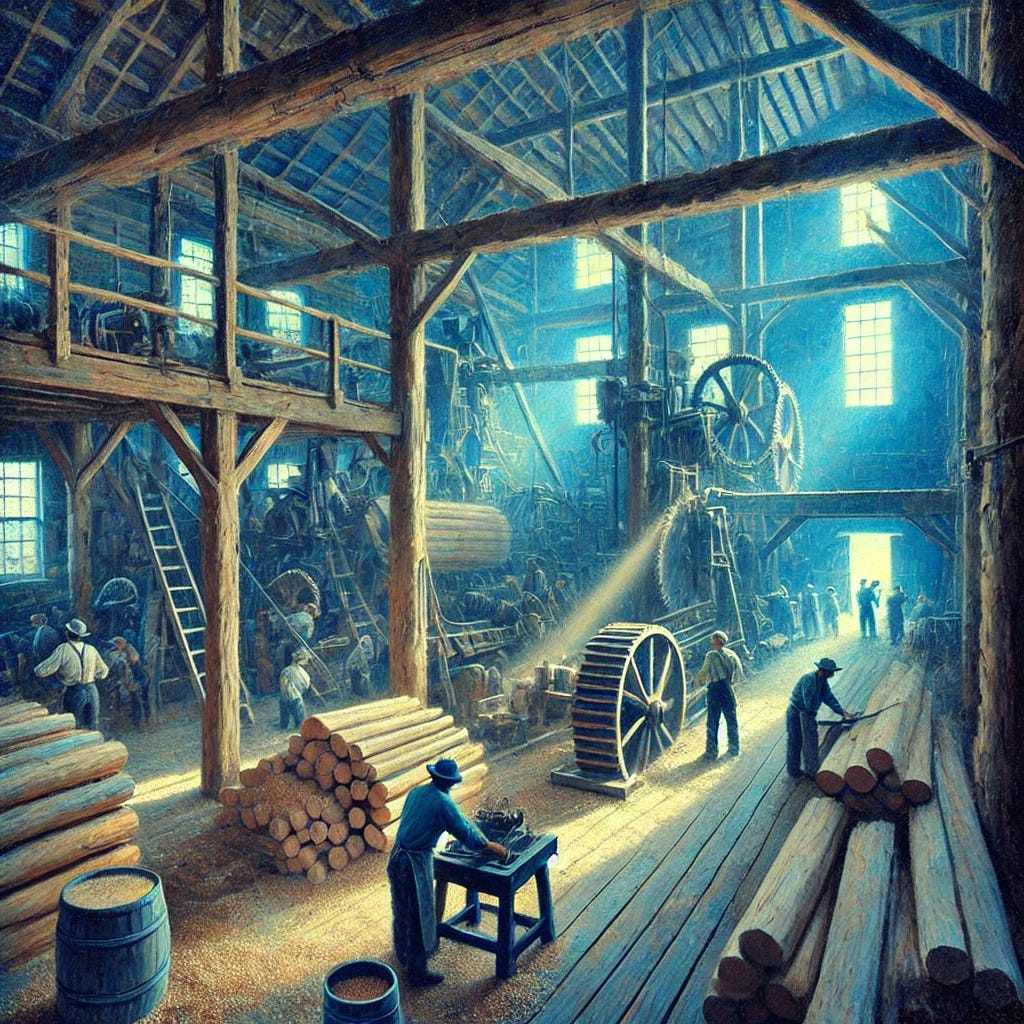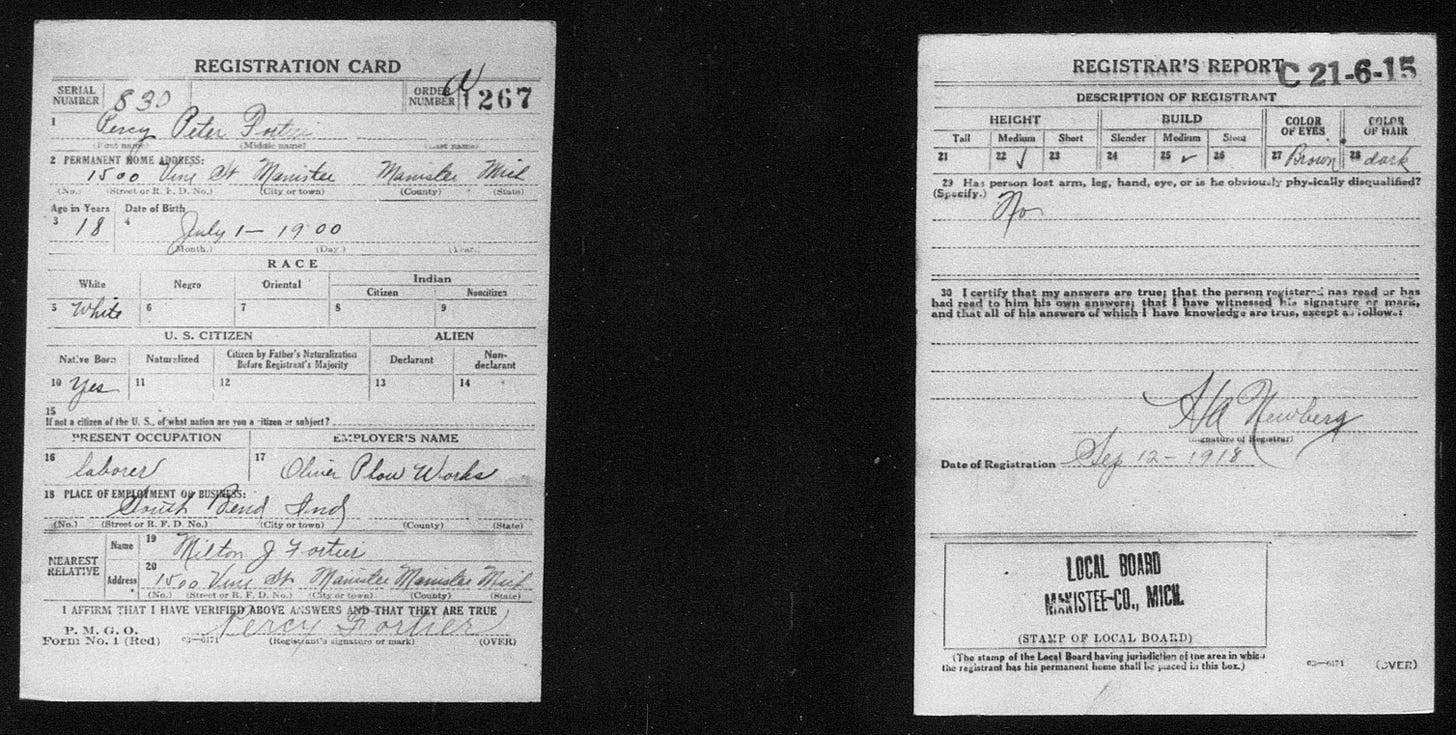Family Anchors, Buying Small Businesses, & Subsidized Housing Summarized
Small Cities Weekly | 07.12.2024
As part of the work we are doing on the Small City Segment, we send out a brief weekly post of thoughts, links, and research in progress that reflect the week’s work. I’d love to hear from you if you have any thoughts, questions, disagreements, or things to add. Please forward this on to people you think might enjoy reading it.

Family Anchors
‘laborer - Oliver Plow Works, South Bend, Ind.’
I squinted at the screen and leaned closer. My mom’s voice was in my ear - “It’s still important to be able to read cursive!”
I scan the document from top to bottom, double checking the date, the name, and the employment section. They all checked out. I relaxed back into my chair with the kind of chuckle that only comes from questioning whether coincidences really exist.
In front of me was the World War I draft registration card of my great-grandfather, Percy Fortier. On Sep. 12, 1918, at the age of 18, he registered and marked down his present occupation as a laborer at Oliver Plow Works in South Bend.
Prior to Monday, my connection to this city was limited to my own. By pure coincidence (and a dash of procrastination typical to a Monday morning), I came across this card. Suddenly I was imagining Percy walking down streets I drive every day and into work under the largest electric sign in the world.

Percy didn’t stay here for long. By the 1920 census he was back home in Manistee, MI working as a laborer in a planing mill, most likely the West Michigan Flooring Company, where his father Milton also worked.
Percy’s employment at one of South Bend’s largest anchor companies spurred me to look into the employment history of more of my family tree.
Both my dad and mom are from Manistee, where both their lineages go back at least five generations. If they weren’t farmers, it turns out working for an anchor company was pretty common amongst my family. They all worked in mills and factories of some sort - places like Manistee Iron Works, West Michigan Flooring Company, and Packaging Corporation of America. Job titles included laborer, saw filer, log driver, log slider, lathe operator, machinist, and even engineer1.
And anchor companies these were - here are some excerpts from a booklet published in 1910 about the West Michigan Flooring Company:
“The company employs about 60 men and keeps them busy from one year’s end to another. Such enterprises mean very much to our community as they bring to our doors the products of the far distant forests and Manistee men who own homes here, pay taxes here, and rear their families here, receive their fair proportion of the cost of manufacturing a crude product into a finished article — thus bringing to our city each year, a large amount of money, which before the establishment of this industry found its way to other points.
“May Manistee be successful in securing many more industries, as good for the general welfare of the community as is ‘this planing company’ and may the business of this concern so increase in volume, that Manistee Made flooring will be asked for and kept in stock in every lumber mart in this broad land.”
This has left me feeling reflective this week, but questioning exactly why.
Maybe it’s because this is the 52nd edition of Small Cities Weekly, marking a year since I started seriously exploring the intersection of these places and their economic pasts, presents, and futures.
Maybe it’s because I’m realizing that anchor companies in small towns and cities provided the opportunity for Percy, Milton, and others to become anchors of my own family for generations to come.
Maybe it’s because I’m wondering where the next generation of these companies will come from and how they will choose to continue the tradition of weaving together profit, place, and people.
Or maybe it’s simply because it’s calming and reassuring to feel connected to a larger story arc, where your inherent interests suddenly seem an obvious continuation of family history.
Ultimately, all of this might just be a roundabout way of naming why I find small cities and the companies that anchor them so important.
At their best, they are places where opportunity is born, built, and passed on to the next generation. The collective project for each generation is to do their part in keeping this thing we call ‘opportunity’ alive and eagerly inviting in the next family tree to take part.
A hundred years from now, just blocks from where I sit today, there could be another Mix finding my name in a census. I can only hope she feels as much a part of this story as I do right now.
Better yet, I can do more than hope. I can do my part.
Links
You can find links from this and all previous editions here.
Think Big, Buy Small, Richard Ruback and Royce Yudkoff, Harvard Business School
Co-hosted by Harvard Business School Professors Richard Ruback and Royce Yudkoff, the show is an extension of their courses on small firms, including Entrepreneurship Through Acquisition, which has been taken by thousands of MBA students, and their highly-regarded book, HBR Guide To Buying A Small Business, which has sold more than 65,000 copies. In this series, Rick and Royce guide listeners through the different milestones of the journey to acquiring an enduringly profitable small business, sharing insights on how to evaluate prospects, raise capital, and ultimately determine if this path is right for you.
Can Advisory Boards Really Add Value?, Susan Ehrlich, Core Innovation Capital
Not too long ago, I joined the venture industry following an operating career in fintech and financial services. As I began to engage with founders, I would not have guessed what the most frequent topic of conversation would be.
You might have thought: cash runway or unit economics – or even the future of crypto, or the state of the economy – and you’d be close. Truth be told, the most frequent topic of conversation has been: Can advisory boards really add value?
My response: Advisory boards are more important than ever!
Subsidized Housing in the US: A Summary, Brian Goggin, Housing in Practice
“Affordable” housing is a common buzzword that can have many different meanings depending on the context. In a policy and real estate settings, this usually means housing that is subsidized by the government and is income-restricted, meaning there is an income ceiling to qualify for it. How much of this housing exists and how does it work?
You can reach me at dustin@invanti.co if you want to chat more about the small city segment!
You’re welcome for my restraint from crafting the obvious pun about the connection between my family tree and the sawmill industry that employed many of them.




